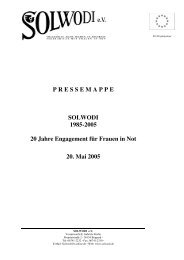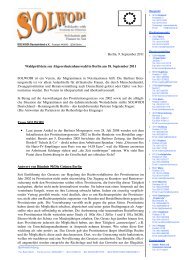Sponsored Vocational Training: Dream of Escape or Reality - Solwodi
Sponsored Vocational Training: Dream of Escape or Reality - Solwodi
Sponsored Vocational Training: Dream of Escape or Reality - Solwodi
You also want an ePaper? Increase the reach of your titles
YUMPU automatically turns print PDFs into web optimized ePapers that Google loves.
Efficacy <strong>of</strong> SOLWODI’s <strong>Vocational</strong> <strong>Training</strong> Scheme 38<br />
abandons scruples’ (de Waal cited in Nugent, 2004: 353).<br />
There is an increasing, observable ideological divide between neo-liberalism in favour <strong>of</strong><br />
humanitarian internationalism versus the neo-comprad<strong>or</strong> the<strong>or</strong>y <strong>of</strong> its critics. ‘The comprad<strong>or</strong><br />
acts as an agent, operating in the interests <strong>of</strong> international capitalism against the interests <strong>of</strong> the<br />
indigenous popular classes’ (Hearn, 2007: 1098). In the w<strong>or</strong>ds <strong>of</strong> Commins (2000), NGOs have<br />
become ‘ladles in the global soup kitchen’. Don<strong>or</strong>s, especially international don<strong>or</strong>s, must accept<br />
that they can make matters w<strong>or</strong>se.<br />
‘It means moving beyond the idea that NGOs are to be strengthened solely to deliver<br />
services. The key is to supp<strong>or</strong>t change in a way that both empowers the po<strong>or</strong>, and<br />
concomitantly promotes institutional ref<strong>or</strong>ms that enable the state to respond to<br />
increased public demand, so that people do not have to take to the streets to achieve<br />
their aims’ (Cammack: 2007: 610).<br />
Fisher (1997: 446) remarks that ‘NGOs are in danger <strong>of</strong> becoming the anti-politics<br />
machine <strong>of</strong> development treating local conditions as problems that require technical and not<br />
structural <strong>or</strong> political solutions’. Nevertheless, he admits, there is no simple <strong>or</strong> steady narrative<br />
<strong>of</strong> good NGOs facing bad governments (Fisher, 1997: 452). Obviously to Nugent (2004: 351)<br />
amongst others, ‘one does not have to be entirely cynical to suppose that NGO, like all human<br />
<strong>or</strong>ganisations, had an interest in perpetuating their existence’.<br />
Lately, the enthusiasm towards Africa’s NGOs has begun to decline as the expectations<br />
<strong>of</strong> Western don<strong>or</strong>s have failed to materialise. Africa’s NGOs have not lived up to their<br />
expectations, development, it seems, has been unsuccessful (Fowler, 2000; Igoe and Kelsall,<br />
2005; Manji and O’Coill: 2002: 568). Scholars w<strong>or</strong>ldwide agree that recipient governments<br />
should be driven by the needs <strong>of</strong> their people, and not by the desires <strong>of</strong> their don<strong>or</strong>s.<br />
4. NGOs in the Context <strong>of</strong> Sex W<strong>or</strong>kers and <strong>Vocational</strong> <strong>Training</strong><br />
The dominant context in which Sex W<strong>or</strong>k has been discussed in social scientific<br />
literature and in the field <strong>of</strong> Africa is HIV prevention and human right issues. This is reflected<br />
by the landscape <strong>of</strong> NGOs on the subject. Most <strong>of</strong> the NGOs targeting SW focus on the health<br />
aspects, defend human rights, and challenge the stigmatisation. Sex W<strong>or</strong>k, rather than being a






